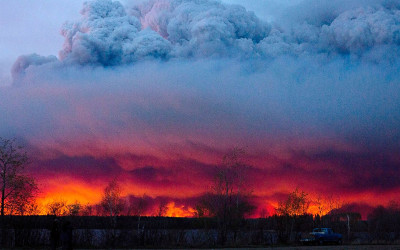AKIPRESS.COM -  Canadian officials will start moving thousands of people from work camps north of devastated Fort McMurray in a mass highway convoy Friday morning if it is safe from a massive wildfire raging in Alberta, ABC News reported.
Canadian officials will start moving thousands of people from work camps north of devastated Fort McMurray in a mass highway convoy Friday morning if it is safe from a massive wildfire raging in Alberta, ABC News reported.
Officials airlifted 8,000 people on Thursday and will continue the airlift Friday, while a mass migration of cars will move south in the morning.
The Alberta provincial government, which declared a state of emergency, said more than 1,100 firefighters, 145 helicopters, 138 pieces of heavy equipment and 22 air tankers were fighting the fire, but Chad Morrison, Alberta's manager of wildfire prevention, said rain is needed.
More than 80,000 people have emptied Fort McMurray in the heart of Canada's oil sands, authorities said.
About 25,000 evacuees moved north in the hours after Tuesday's mandatory evacuation, where oil sands work camps were converted to house people. But the bulk of the more than 80,000 evacuees fled south to Edmonton and elsewhere, and officials are moving everyone south where they can get better support services.
Officials flew 8,000 evacuees to Edmonton and Calgary by Thursday night. They hope the highway will become safe enough on Friday to move the remaining people out via the south. It was not safe Thursday.
Alberta Premier Rachel Notley said the first convoy will be 400 vehicles and officials would see how that goes.
Fort McMurray is surrounded by wilderness and is Canada's main oil sands town. Despite the size of the town and its importance to the Canadian economy, there are essentially only two ways out via car. The region has the third largest reserves of oil in the world behind Saudi Arabia and Venezuela.Aided by high winds, scorching heat and low humidity, the fire grew from 75 square kilometers (29 square miles) Tuesday to 100 square kilometers (38.6 square miles) on Wednesday, but by Thursday it was almost nine times that — at 850 square kilometers (328.2 square miles). That's an area roughly the size of Calgary — Alberta's largest city.
Unseasonably hot temperatures combined with dry conditions have transformed the boreal forest in much of Alberta into a tinder box. Morrison said they are investigating the cause of the fire but he said it started in a remote forested area and said it could have been lightning.
